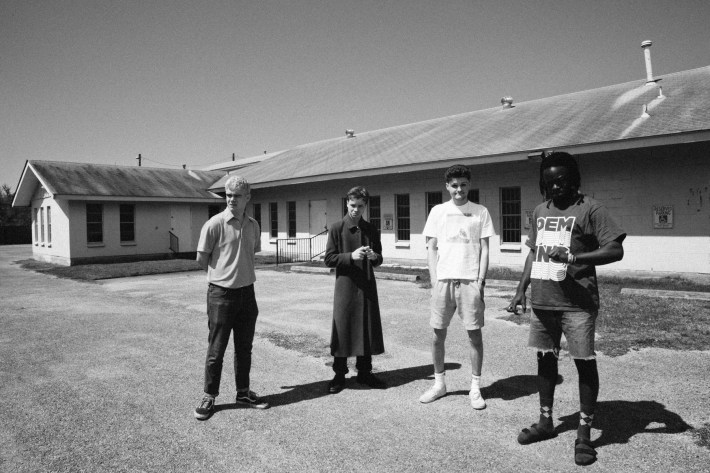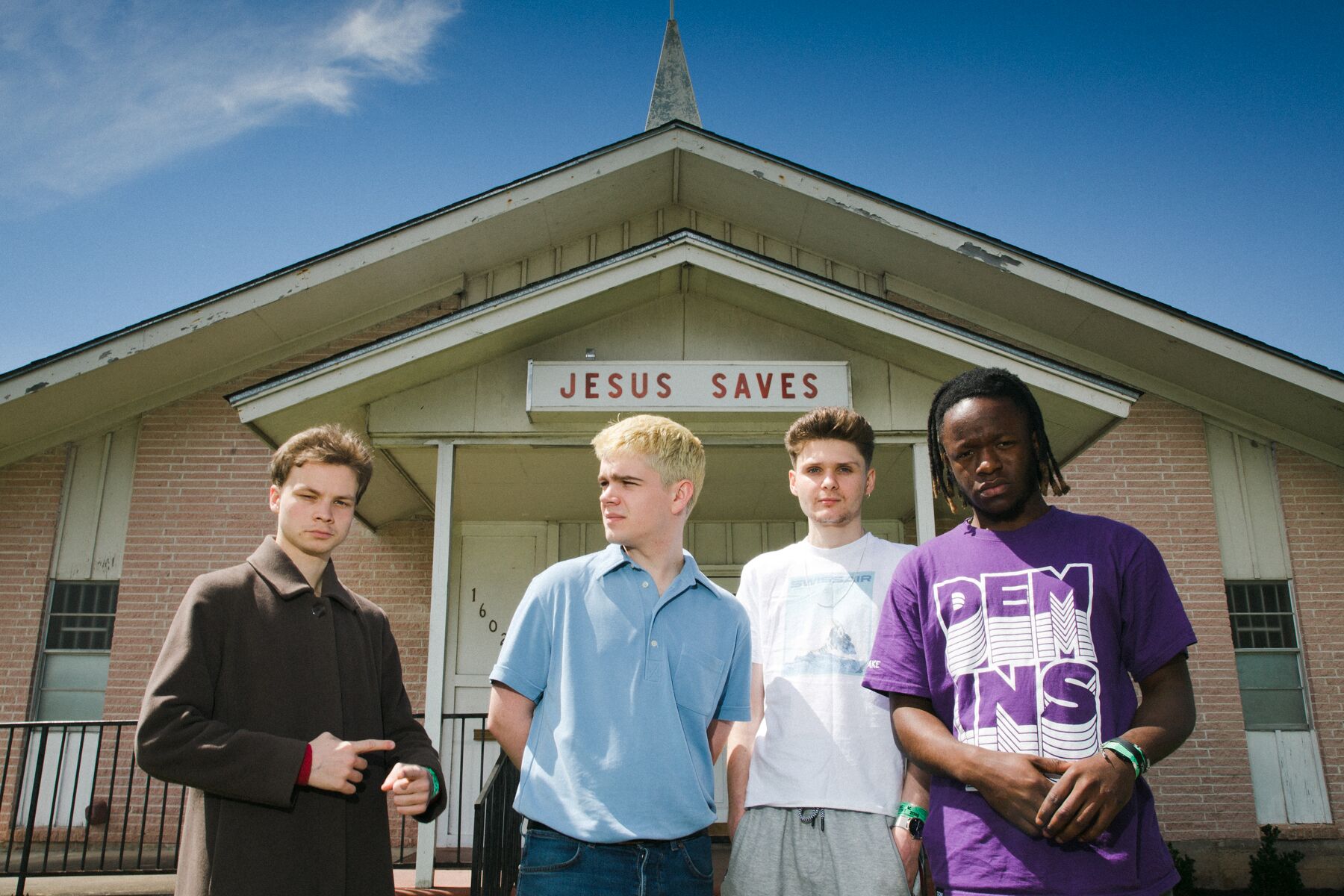Throughout SXSW last week, there was one question everyone invested in this year's crop of emerging indie names seemed to be asking: "Have you seen Black Midi yet?"
Over the course of the last year and change, the enigmatic London quartet has garnered a ton of buzz in their home country. Perhaps we're accustomed to that -- the UK press is historically known for cycles of hyperbolic praise and abrupt disinterest in younger acts -- but the story still played out unconventionally by the standards of the late '10s. The fervor building around Black Midi was almost entirely based on word-of-mouth raves in response to their live shows around London; there was no guerrilla marketing, no backing from a major PR agency, no clever online manipulation. To this date, Black Midi have still only released two singles.
So even outside of the fact that industry interest had almost pre-ordained Black Midi as one of the breakout names of SXSW 2019, it still felt like an event that they were finally making it Stateside. Unless you had happened to catch Black Midi in the UK or Europe, this was your first chance to see if this new band lived up to their reputation. It was the first time to decide, for yourself, whether this was truly one of the most exciting new guitar bands out there.
The day after their final SXSW performance, the four of them -- Geordie Greep (vocals/guitar), Cameron Picton (bass/vocals), Matt Kelvin (guitar), and Morgan Simpson (drums) -- are hanging around a rented house on a quiet street deep into east Austin, far removed from the action of the festival. This seems to suit them well. Though not at all as standoffish as you might expect from the intense nature of their music, Black Midi don't come across like the types to have much interest in partying around town once they're done playing.
All four of them are fairly soft-spoken, a couple barely ever speaking above a whisper or mutter. This has led some to characterize them as shy, which in turn is typically accompanied by a reminder of just how young Black Midi still are. Not yet 21, they weren't even allowed to stay in the venue before their own San Diego show after soundchecking; they had to go outside and wait in their van until their set time. They ran into similar issues at SXSW, being forbidden to enter a venue they were about to play until a manager came to get them.
As you might've guessed, Black Midi are an almost entirely different beast onstage. Still averse to banter, there's little resembling the silence of their conversations as they fill the stage with noise, overwhelming grooves, songs constricting and then exploding around you. It's one of those sounds that you think you can trace to a certain collection of antecedents, and yet sounds unlike anything anyone else is up to. And as much as the band was bemused by not being allowed into their own gigs, they are even more so by the range of opinions they elicited during SXSW.
"For a lot of people it's the first time they're seeing us and they're just trying to work it out," Simpson says by way of explanation that he hasn't gotten much of a sense for the crowd reactions in America yet. But he's not wrong: In terms of "trying to work it out," I hear people compare Black Midi to This Heat, but I also hear people compare them to Foals and Death Grips, or to "Touch And Go Records in the late '80s." Post-punk, electronic, hardcore, math-rock, noise -- that's all thrown around, too. It's such an elusive, weird sound that it evokes totally different reference points from different people.
"It's like a Rorschach test," Greep says with a kind of dry glee. "Rage Against The Machine, a police officer said that the other day. 'Good shit, man, got RATM vibes, man.' He was doing security at the door, some big guy."
"He was jacked, he was shaped like a Dorito," Picton adds in awe.
As with many stories like Black Midi's, the band didn't appear fully-formed, with this bizarre shape-shifting sound, quite as suddenly as it seems from the outside. Greep, Picton, Kelvin, and Simpson all met while attending the BRIT School, a performing arts school that also counts famous pop names such as Adele, Amy Winehouse, and Jessie J amongst its alumni. Despite that pedigree, Black Midi weren't necessarily outliers. "I think it just had a reputation as pop, but people are very open-minded," Picton describes. "Just doing their own thing."
"[Our sound] was gestating for a long time, because we had the two years at BRIT School to make mistakes and do crazy outlandish jams and stuff," Greep explains. "As soon as we left we took the best bits of that and reined it in to make songs."

The band began as matter-of-factly as the individual members discuss their work now. Greep was jamming with Kelvin and with Simpson separately, and they decided to join together and try and do a show upon graduating from the BRIT School. Greep emailed venues around town, eventually getting a response from the Windmill in Brixton. The show was meant to be a one-off; they only got Picton into the fold once they'd gotten the gig, and had one rehearsal the day of. But the venue's booker Tim Curry took to their sound. He'd wind up being an early patron of Black Midi, eventually giving them a residency at the Windmill. "Tim got it from the first time we played there," Greep remembers.
"He wants to support music he likes, give them a space to develop," Picton says.
"If it wasn't for him, we wouldn't be a band," Simpson adds.
It picked up from there. Dan Carey saw the first night of Black Midi's residency at the Windmill, and invited the band to record with him; he's produced their two singles thus far. In the beginning of 2018, Shame -- themselves veterans of the Windmill incubator -- urged fans to arrive early for Black Midi's opening set at one of their own shows, calling them the "best band in London."
At that point in time, those singles hadn't even come out yet. But London's curiosity around the band ignited, leading to people getting whatever small piece of info or taste they could. More recently, the situation started to become more official: They've hired publicists on both sides of the Atlantic, and a deal with Rough Trade was announced earlier this year.
Being able to identify the incremental steps that led to this point, the members of Black Midi are more prone to characterize their growth as "a slow burn." They are, mostly, nonplussed about the attention upon them so far; they are also likely to casually downplay some of the mythologizing that's already occurred with them, such as the idea that they were this mysterious London entity intentionally maintaining total obscurity on the web. "It was exaggerated a bit to fit the narrative," Picton argues.
At the same time, when I ask if they bristle at being described as some kind of shadowy art collective, Greep grins slyly and responds: "There are worse things to be described as."
There are reasons Black Midi have been talked about in these kind of baffled, fascinated, exaggerated tones. You can get a hint of it from the two singles that are out there, "bmbmbm" (pronounced by the band as "Boom Boom Boom") and "Speedway." The former dates back to their first meeting with Carey, and remains a song that latches onto new listeners immediately. Defined by Greep's yelping, unnerved vocals and a lurching-then-explosive rhythm, it'd seem to announce Black Midi as an addicting noise-rock band. Then "Speedway" counters that, utilizing krautrock rhythms, Picton's more restrained vocals, and Talking Heads funk to unveil a whole other side of Black Midi.
Whether you caught them in those nascent Windmill days or last week at SXSW, you know that those two tracks are themselves only a hint of what else can happen in Black Midi's music. These guys often seem like players, first, and you can almost hear this in some of the other compositions, the idea that jams were cut down and woven together into new pieces.
Almost every song Black Midi performs unfolds in surprising ways, one riff quickly switching to another, one mellow passage blooming into caustic screams and dissonant guitars, songs constantly collapsing in on themselves and being born again. You could call it post-punk, in a very broad and reductive way. But the songs are exploratory and surprising, existing in a lineage yes but also on their own wavelength entirely.
The name Black Midi comes from a Japanese subgenre, defined by remixing MIDI files into compositions so overloaded with notes that their scores would look nearly entirely black. It was a name Greep gravitated to purely for aesthetic reasons, stumbling across it online before he even had a band and liking the sound of the moniker without any knowledge of the genre's nature.
And yet, there's a kind of cosmic luck to it in the end, a fitting correlation to the characteristics of Black Midi's own music. Guitar notes cascade, flood, and frantically unspool, before suddenly transforming into seething sheets of distortion; Greep's and Picton's vocals can be one more flurry of melodic information over already hyperactive compositions; Simpson's drums are the kind of rhythms as crucial to the nature of the songwriting as the stringed instruments. It isn't quite the same as music literally made up of too many notes to conceive, but there is a similar complexity to what Black Midi are doing. There is idea after idea after idea colliding and mutating within their music, distant strains you can hear and yet are forced to hear anew a couple times over.
There's a reason people might breathlessly ask if you've seen Black Midi yet, and it's not just because the hype. It's because they're trying, to borrow Simpson's phrasing, to work it out. It's because it's something that demands to be talked over once you've taken it in. It's because each Black Midi show feels, in its way, evolutionary.
Whether it plays out as malleability or creative restlessness, this is one part of Black Midi that does seem to be by design. Picton talks about how the goal going forward would be to change the live iteration of Black Midi as much as possible, perhaps altering their lineup as they go. They describe a recent Windmill gig in which they all decided to learn new instruments, leading to accordion/flute/banjo renditions of Pogues covers and video game theme songs. ("They had a good laugh, I think," Greep responds when asked how the London regulars reacted to this, well, surprising version of a Black Midi show.)
This, more than any kind of thematic throughlines in their music or career narratives, seems to be the main thing Black Midi think about. That the new music they've stumbled upon is not the end destination, that there are more evolutionary shows and moments to be had. That they aren't satisfied with all the adoration this initial stage of Black Midi has won, that there are further transformations to undertake. After all, in a recent interview, Greep proclaimed that Black Midi's music would soon be "unrecognizable" compared to what it is today.
"Obviously that's optimistic," Greep admits when I bring up the quote. But, in one of the few emphatic moments in our conversation, he reiterates the mission statement behind such a claim. "You don't want to get stagnant, doing the same thing. Keep it going, keep it going. Because, you know, if you keep playing the same thing, it's going to get boring, isn't it?"

If you are in or around New York, Black Midi have two post-SXSW shows left in Brooklyn: 3/20 at Union Pool and 3/21 at Alphaville.






